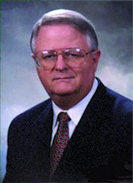William Harmon
Army, O-8, retired
"You have organizational and leadership skills that are desperately needed in industry and your community."
I served in the United States Army for 32 years. The last 10 years of my military career were spent in project and program management, building tactical computer systems. During this period, I gained insights into the ease and the complications of systems integration, and that the "latest" technology is not always the best solution for the problem at hand. After my retirement, my wife and I moved back to our hometown in Arkansas. The transition was fairly easy; we planned ahead and our children were grown.
My first civilian job was as a visiting professor at Arkansas Tech University, teaching summer school. I then went to Perot Systems in Dallas as CIO (chief intelligence officer) after about one year of retirement. I took the position at Perot Systems at the request of a friend, retired Lt. Gen. Jack Woodmansee, to help organize the technical focus and structure for Perot Systems. The job was fascinating, and I worked with some extremely talented people with great skills. I was also working with some former military colleagues, which made it even more enjoyable.

After retiring from Perot Systems in 1998, I returned to Arkansas Tech University as the CIO (associate vice president for information technology). I was the project manager assigned to bring our new $13.3 million library and technology center online. The Pendergraft Library and Technology Center has now been open one year. In July of this year, I assumed the William E. Lemley Endowed Chair of Business and am now teaching management information systems in the School of Business.
The biggest thing I miss about the military are friends who were willing to give their time and sometimes their lives for something more important than themselves, and the sense of urgency about the mission. In the military, you learn many skills that have a sense of urgency about them; they are survival skills that help you and others stay alive in life-threatening situations. You will miss this sense of focused urgency in the civilian world.
I have the following advice to military personnel considering retirement or separation: Do not underestimate your value to industry or your community. You have organizational and leadership skills that are desperately needed in industry and your community. Industry does not have a well-organized career progression training system like the military (Basic Course; Advanced Course; CGSC, or Command and General Staff College; War College). In the civilian environment, staff coordination and problem-solving methodologies are lacking in most large companies.
During my career in the military, there was an unquestioned degree of loyalty that a soldier gave to the Army and the Army returned to the soldier. This type of loyalty may not exist in your new organization. Recognize business as an organizational structure that is profit motivated, where tough decisions are often made at the expense of personnel in order for the business to survive. Once you recognize the character of your new environment, understand it and act accordingly.
Compiled by Barbara Poisson
The Next Step: Find the Right Job
Whether you want to polish up your resume, find veteran job fairs in your area, or connect with employers looking to hire veterans, Military.com can help. Sign up for a free Military.com membership to have job postings, guides and advice, and more delivered directly to your inbox.











